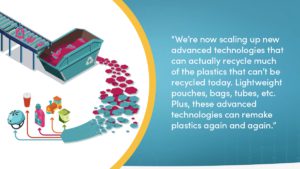I’ve been grumbling lately about the current state of play by my beloved Red Raiders at my alma mater, Texas Tech.
Similarly, I’ve been hearing a fair amount of grumbling about the current state of play in plastics recycling. Like me with my team, it seems more than a few people are unhappy with progress.
If recycling were a football game, I’d say it’s time we changed the game plan. And give the back-up quarterback a shot. Here’s why.
Just a few decades ago, we started to collect and recycle plastic bottles/containers. There’s been considerable success. For example, today the recycling rate of plastic bottles is nearing the rate of glass bottles/containers. For context, we recycle nearly a third of bottles made with PET (#1), the plastic typically used to make water and soft drink bottles. And about the same percentage of bottles made with HDPE (#2), typically used in milk jugs and detergent bottles.
We can build on this incomplete success and do a lot better, as an industry and as a nation.
At the same time, our nation’s recycling game is changing, and we need to change with it.
When my wife and I go grocery shopping, I like to show her how much stuff now comes in thin bags and resealable pouches instead of heavier boxes, bottles, and cans. I will explain how this new, lightweight packaging typically uses less energy and material, which helps reduce greenhouse gas emissions and waste.
This is when she reminds me why she prefers to shop alone.
Anyway, packaging is moving from heavier to lighter, from metals/glass/paper to plastics. Informed companies are basically choosing this thin, lightweight packaging to help achieve their sustainability goals.
On the flip side, this sustainability shift has complicated recycling. We can’t toss most of these new-ish materials in our curbside recycling bin. So what do we do with them?
We need a change in our game plan. And even a new player.
We know that using plastics can help improve sustainability. But as a nation we still need to manage it after use. And if conventional recycling programs can’t manage it, we need to change. And that’s what America’s Plastic Makers are doing.
Two major changes:
- Change the game plan. We’re asking Congress to update our outdated recycling laws to take into account the changing nature of the materials we all use today. Our nation’s policies should establish plastics recycling standards, require plastic packaging to use recycled content, figure out an equitable way for companies to pay for it, and more. We call it 5 Actions for Sustainable Change. It’s a winning game plan.
- Bring in the back-up quarterback. We’re now scaling up new advanced technologies that can actually recycle much of the plastics that can’t be recycled today. Lightweight pouches, bags, tubes, etc. Plus, these advanced technologies can remake plastics again and again. (We’ll alternate with the starting quarterback because we need him, too.)

More on advanced recycling here.
Look, everybody – and I mean everybody – wants us to make as much plastics as possible from used plastics. America’s Plastic Makers do, too. It reduces reliance on fossil resources and further reduces the environmental footprint of plastics. And we believe it’s the number one thing we can do to help keep plastics out of our environment.
As we transition to a circular economy for plastics – in which plastics are reused instead of discarded – I’m sure we’ll continue to hear grumbling about the speed of change. That’s OK. We’ll keep our eye on the ball and a plan of action that will create real solutions, real results.
In short, we’re focused on making sustainable change. In state houses, our nation’s capital, and globally. And in our business models to embrace technologies that can help us win the game.
Now if only my Red Raiders could figure out a winning game plan…

